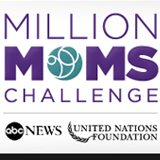
By Dana Hughes for ABC’s Million Moms Challenge
Durban, South Africa- Many Americans think of midwifery as being a movement from centuries past: old stodgy women going to log cabins and delivering babies. But for millions of women around the world today, a midwife is the only contact she and her new baby may have with any kind of professional care. Simply put, a midwife can mean the difference between whether an expectant mother and her newborn child live – or die.
The first ever global report on midwifery, published by the United Nations Population Fund (UNFPA), estimates that at least 350,000 women die each year during pregnancy or childbirth. The report also finds that two million newborns die within 24 hours and an additional 2.6 million babies are stillborn because of inadequate maternal and post-natal healthcare.
The State of the World’s Midwifery Report 2011 was released in Durban, South Africa at the International Confederation of Midwives Congress last month and provides new information and data gathered from 58 countries across countries with the world’s highest maternal and infant mortality rates. While the numbers of deaths are staggering, the number of lives the report says midwives could save is even more impressive. With more training and support of midwives in the world’s poorest countries, the report estimates 3.6 million mothers and babies could be saved.
Catherine Ojo, a midwife from Northern Nigeria has been a midwife for more than 30 years. In that time she’s delivered thousands of babies, but says she’s also seen more than one hundred die. Nigeria suffers from a fatal combination for expectant mothers; lack of infrastructure and education.
“Women cannot really make decisions for themselves. Especially the ones who are not educated. And many are not educated. Even when they go to the anti-natal clinic, because of their low income status, some of these rural women do cannot come back to the hospital to deliver.” Ojo tells ABC News. “There’s no light in the rural areas, no good water supply, no paved roads. So the midwives, in the rural areas especially, they have a lot to cope with.”
Ojo, 55, is a chief nursing officer at a special neo-natal unit in Kaduna, a remote city in Northern Nigeria. In addition to delivering babies and providing care to mothers, she also teaches and mentors younger midwives. Save the Children and the International Confederation of Midwives have given her one of this year’s “hero midwife” awards for her life-saving work in a country where at least 1400 stillbirth and newborn die every day; the largest number in Africa.
Ojo, an outspoken advocate for the rights of women and better support for midwives, says her work is based on one basic principle: “No woman should die giving life.”
“We hear a lot about sports players, about music heroes, about actors and actresses but these are real heroes,” says Dr.Joy Lawn, director of global evidence and policy for Save the Children’s Saving Newborn Lives program. “This is the third time Save the Children has presented a global midwife award and we do this because there are amazing midwives all over the world in these really challenging settings and we don’t hear about them.”
This year’s other “hero midwife” is Sadya Naemi, a midwife from Afghanistan. On the surface it appears Naemi is on the opposite end of the spectrum from Ojo. At 19 years-old, she has been a practicing midwife for only two years, and is the only one for her entire district. But like Ojo, her work is saving lives in a country where professional maternal and neonatal healthcare is sorely needed. In Afghanistan women have a nearly 10 percent chance of dying during childbirth during their lifetimes, and one child in five dies before reaching the age of five-years-old.
Naemi says being a midwife is her calling, but she too faces enormous challenges providing care in a war-torn country where women are not supposed to be in visible professions.
“The community is taught that I’m just a young girl and I’m un-married. How can I help their families?” says Naemi. “But the more I kept helping people they more they began to accept me.”
Her work is in fact so risky that simply being honored for it has put her life in danger. ABC News was asked to change her name for this article and not to identify the location of her village after her life was threatened following her return from the South Africa conference to Afghanistan.
Dr. Lawn is a leading global expert on newborn health whose work on newborn and stillbirth deaths was published in the prestigious Lancet journal of journal of medicine and has been recognized around the world. But Dr. Lawn says its women like Sadya Naemi and Catherine Ojo who deserve the praise.
“I’m inspired by these two midves,” she says “I’m inspred by the thousands of midwives like them really struggling and really trying to make a difference.”
Without the care of a midwife, Dr. Lawn would not be doing the work she is today, because she probably would not still be alive. Her parents were missionaries living in rural Uganda when her mother went into labor earlier than expected. Deep in the bush, her parents had no choice but to go to a rudimentary clinic. There, after a difficult labor, which lasted all night, Joy was born. Her name a reflection of the relief her parents felt that she and her mother survived.
“I’m here today because a midwife shouted for me and Im sure my mother was also shouting and because my family cried out for me,” says Dr. Lawn. “Today there is still over 1.2 million babies who die in the first month of life in Africa. Africa carries half of the world’s maternal deaths and those could be avoided with that same care I received.”
